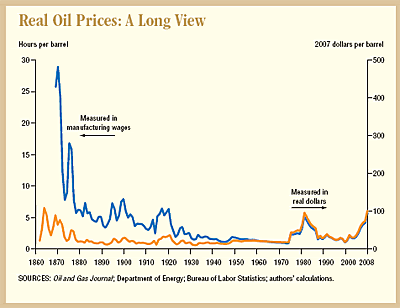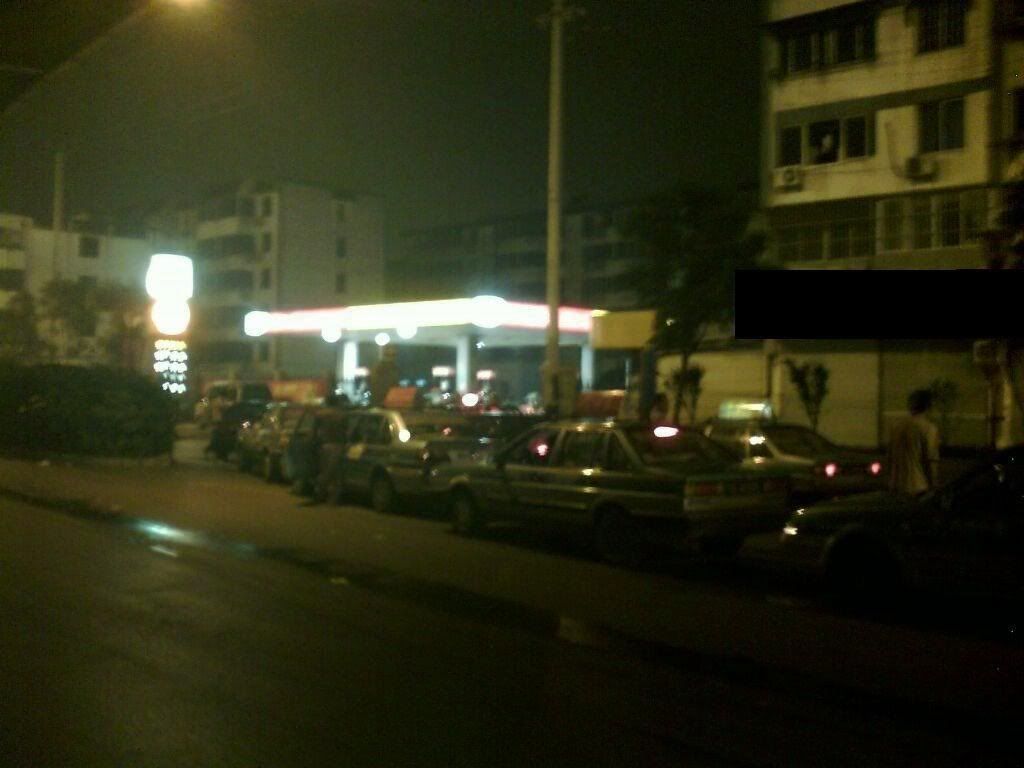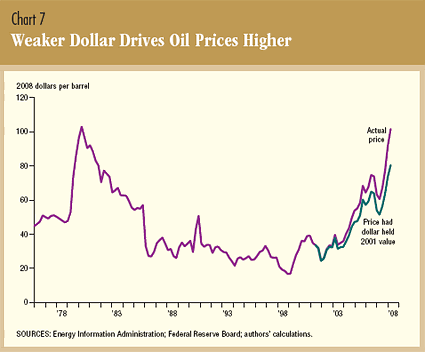I was in the midst of writing a diary about how there aren't "2 Americas", a la John Edwards, but 3, when it became clear that so much information has become available this week concerning the forces affecting Americans' demand for oil, that it demanded its own diary. Even if the world has reached the plateau of "Peak Oil" and supplies will gradually be rationed at higher and higher prices, there are going to be booms and busts along the way. I'm here to tell you that the evidence suggests that there has been a speculative boom in the last 6-9 months and we may shortly see a bust, echoing the sudden decline of oil from $80 to $55 a barrel just before the 2006 elections. The boom and the bust, if it happens, have everything to do with (1) Subsidies to gas consumption by Asian governments, (2) hoarding (in tanker ships), and (3) unintended consequences of the Fed's bailing out billionaires, that have added about $1 to every single gallon of gas you buy.
I. Americans have been consuming less gas ever since prices hit $3 a gallon late last year
In April the E.I.A. reported that
Gasoline consumption has been declining for at least six months. ....
During ... the second half of 2007, gasoline consumption declined by 0.1 percent from the year before. In fact, fourth-quarter consumption fell by 0.4 percent....
The first quarter of 2008 continued to show an even sharper decline in consumption of 0.6 percent compared to the same period in 2007.
Then this month
The Department of Transportation said figures from March show the steepest decrease in driving ever recorded.
Compared with March a year earlier, Americans drove an estimated 4.3 percent less -- that's 11 billion fewer miles, the DOT's Federal Highway Administration said Monday, calling it "the sharpest yearly drop for any month in FHWA history." Records have been kept since 1942.
....
Some Americans have turned to public transportation. Ridership increased by 2.1 percent in 2007, in part because of rising gas prices, according to the American Public Transportation Association.Americans took 10.3 billion trips on public transportation in 2007, the highest level in 50 years, the group said.
The Energy Information Administration says gas consumption for the first three months of 2008 is estimated to be down about 0.6 percent from the same time period in 2007.
II. But conventional wisdom has become that US consumption is becoming irrelevant
In an article last month entitled, "Does the US Matter Anymore?" Mike Wittner, the head of oil research at Societe Generale SA, argued that increasing Asian consumption now trumped US consumption treands:
China, India, Russia and the Middle East for the first time will consume more crude oil than the U.S., burning 20.67 million barrels a day this year, an increase of 4.4 percent, according to the International Energy Agency in Paris. U.S. demand will contract 2 percent to 20.38 million barrels daily, the IEA says.
Economic growth of more than 8 percent in China and India, coupled with increasing car ownership among the countries' combined populations of 2.45 billion people, will more than compensate for falling U.S. demand. Oil use worldwide will increase 2 percent this year because of growth in emerging markets, the Paris-based IEA says.
``Does the U.S. matter anymore?'' said Mike Wittner, head of oil research at Societe Generale SA in London. ``Has the U.S. mattered for the last few years? It is debatable. As far as the oil market is concerned, demand growth is going to be continued to be driven by China and the Middle East.''
Thus, even if the US slipped into recession and its demand for gas declined, which would formerly cause a decline in gasoline prices (and in the US inflation rate), that was no longer true, say the experts. The US faces a grim future of $150 and $200 per barrel oil, even as its recession deepens. Even now, according to the Dallas Fed, a barrel of oil now is at or near a 150 year high, although they point out that measured in terms of hourly wages or percentage of income, the situation isn't quite that gloomy:

Here's the Dallas Fed's description:
As oil prices rose to $50, $70 and $90 a barrel, analysts often pointed out that these prices hadn't yet breached the all-time high in real, or inflation-adjusted, terms. That barrier finally fell in early March, when prices topped the real 1980 peak.
Looking beyond post–World War II or even 20th century oil prices presents a somewhat different picture. Real oil prices were nearly as high as they are today when North American oil production began before the Civil War in 1860.
Oil prices can also be measured relative to changes in productivity and the level of technology, factors captured by manufacturing wages.[1] In the first quarter of this year, a typical factory worker needed slightly less than four hours to “earn” one barrel of oil. In 1980, it was just above five hours. Going further back in time, the number rises—to 6.4 hours in 1920, 7.9 in 1910 and an average of 15.4 in the 1870s.
Technological advances have bolstered productivity, raised wages and made the work-time price of oil lower today than it was in the late 19th and early 20th centuries.
Finally, it is important to note that—despite rising real prices and imports—oil siphons relatively less money out of the American economy than it did in the past. Expenditures on petroleum products today account for about 5 percent of all after-tax income earned in the United States, less than half of the 11.6 percent spent in 1980.
The Dallas Fed further explains how as currencies appreciate compared with the dollar, their prices become comparatively cheaper:
Oil has long traded in U.S. dollars. Having a single-currency system lowers transaction costs for a commodity that trades globally. In recent years—while oil prices were rising on supply and demand fundamentals—the dollar has weakened against the currencies of the nation’s trading partners, particularly the European Union’s. The dollar has fallen 46 percent from its mid-2001 peak against the euro and 21 percent since 2004.
A declining dollar makes oil cheaper for Europeans and other foreign consumers, propping up their demand. A weakening U.S. currency also reduces the dollar-denominated supply from foreign producers. Together, these two factors exert additional upward pressure on prices.
But is the conventional wisdom true? Maybe not.
3. Asian government subsidies have distorted demand, but are under great pressure now.
Bloomberg reports that
Asian governments are squirming.
With crude oil near $130 a barrel, their strategy to shield consumers from high energy prices is becoming a drag on national budgets. The unsustainable subsidies and price controls must go, say economists.
....
A survey of 42 developing countries by the International Monetary Fund showed that as much as three-fifths of the extra cost of 2007 was absorbed by governments and refiners. Only eight nations fully passed on last year's 48 percent increase in gasoline prices to the retail consumers in their countries
....
A report last year by McKinsey & Co. estimated that ending subsidies would prune demand for transportation fuels by 3 million barrels a day. Contrast this with the increase in crude- oil production promised by Saudi Arabia: 300,000 barrels a day.
....
Indian refiners, such as state-run Indian Oil Corp., are together losing about $140 million a day because the government hasn't allowed them full cost recovery. The price of diesel sold at gas stations in New Delhi has risen just 4 percent since September 2006.
And gasoline was recently selling in China for the equivalent of $2.82 a gallon:
- China Petroleum & Chemical Corp. was paid about 7 billion yuan ($1 billion) in state subsidies for oil imports in April, more than what it got for the whole of last year, according to a company official.
China paid Sinopec, as Asia's largest refiner is known, 600 to 700 yuan for each metric ton of crude oil imported as compensation for selling fuels below cost in the domestic market, the official said today, asking not to be identified because of company rules. The refiner imported more than 10 million tons of crude oil last month, the official said.
State-controlled Sinopec is losing about 3,000 yuan on each metric ton of oil products it makes because of near-record crude oil prices, spokesman Chen Ge told reporters yesterday in Beijing. China controls fuel prices to limit their effect on inflation in the world's most-populous nation, reducing refiners' ability to pass on higher crude costs.
Grace Liu, an oil analyst with Guotai Junan Securities Hong Kong Co., said ...``We estimate the full-year subsidy for Sinopec will exceed 60 billion yuan if oil remains at about $100 a barrel.''
Sinopec received 4.9 billion yuan to cover refining losses in 2007 and 7.4 billion yuan for the first quarter, it said in March.
... Even so, that assistance covers less than half of Sinopec's refining losses, Chairman Su Shulin said yesterday.
The International Herald Tribune fleshed out just how dramatic are the losses that Chinese oil companies are being forced to incur:
China's two main state oil companies .... complain[ed that] their refining units are losing billions of dollars due to price controls that are meant to shield China's poor from skyrocketing global crude prices.
The controls "resulted in great losses in the oil-refinery business and massive decline in overall performance," the two companies in their identically worded statements.
CNPC and Sinopec were ordered in November to boost imports to ease a fuel shortage blamed on the price controls, which refiners said forced them to cut output in order to avoid losses.
....
Beijing froze retail gasoline and diesel prices in September as part of efforts to contain rising inflation. It raised prices by about 10 percent in November to curb surging demand but has rejected appeals by the oil companies for more increases.
....
Sinopec, Asia's biggest refiner by volume, said this month its refining unit lost 13.7 billion yuan (US$2 billion; euro1.3 billion) in the latest quarter due to the price freeze. Sinopec said it received a 12.3 billion yuan (US$1.75 billion; euro1.1 billion) government subsidy to make up for the loss.CNPC's publicly traded arm, PetroChina Ltd., said in March that its refining unit lost 20.1 billion yuan (US$2.9 billion; euro1.8 billion) in the latest quarter due to the price freeze.
China is the world's second-largest oil consumer after the United States. Imports rose by 12.3 percent last year, according to the government.
Refiners have tried to cut their losses by reducing output, leading to fuel shortages, as seen in scenes like this (h/t to Russ Winter):

Those generous subsidies which have shielded consumer demand, have been a huge reason why the decrease in US demand has not been mirrored in Asia. But the subsidies have come at ever more huge costs to the mercantilistic Asian governments, and one by one they are being forced to let go, with fearful consequences:
One by one, countries across Asia and the Middle East are being forced to abandon price controls on fuel and energy, bringing hundreds of millions of consumers face to face with the true market cost of oil. The effect has already begun to chip away at world demand and may ultimately trigger a slide in crude prices.
Egypt - the most populous Arab state - has raised petrol prices by 40pc, despite protests in Cairo. Sri Lanka lifted diesel and petrol prices by 25pc over the weekend. India may have to follow soon to prevent its trade and budget deficits climbing to dangerous levels. "The situation is alarming. We need to stem the rot," said India's energy secretary, MS Srinivasan.
Indonesia has raised petrol prices by 33pc in order to restore fiscal discipline (subsidies are 3pc of GDP). Taiwan has mooted a 20pc rise, and Malaysia is to peel back controls. While China has so far resisted calls for price freedom, the policy is becoming unsustainable. Analysts predict a change in tack after the finish of the Beijing Olympics at the end of August.
Beijing froze fuel prices last year to shield its public from surging global oil costs, barring refiners from passing on record-high crude costs to consumers. Refiners have tried to cut their losses by reducing output, leading to fuel shortages.
....
China is the world's second-biggest oil consumer after the United States, and its imports are growing by more than 10 percent a year. The price controls have hampered government efforts to promote conservation, and the country's fuel consumption is also rising more than 10 percent a year.
The sudden increases in oil prices are having dramatic political effects in Asia.
Indonesia and Taiwan both pledged payments to low income families to help them cope with planned fuel-price increases and New Zealand's Finance Minister Michael Cullen today announced tax cuts designed to help workers struggling with living costs. China, suffering the deadliest earthquake in 32 years, said this week it has no plans to lift fuel-price caps
....
Malaysia's fuel subsidy bill may reach as much as 53 billion ringgit ($16.5 billion) this year, Second Finance Minister Nor Mohamed Yakcop said today. The government, which had its worst electoral result in March after higher living costs angered voters, has avoided increasing local fuel prices.Malaysia's government will announce new subsidy arrangements in two months, Nor said, adding that the cost of providing fuel subsidies was the biggest problem for the nation and that inflation was not a ``major issue.''
Vietnam will keep gasoline and oil prices at current levels from now until June to tame inflation and continue to cover company losses caused by rising crude levels, Tuoi Tre newspaper reported today, citing Deputy Prime Minister Nguyen Sinh Hung.
Most Asian policy makers are holding off interest rate reductions needed to boost growth as inflation accelerates across the region.
China's consumer prices rose 8.5 percent last month, close to the fastest pace since 1996. Inflation rates in Sri Lanka and Vietnam have exceeded 20 percent, while Singapore's consumer price gains have reached levels not seen since 1982.
Indonesia's drastic decrease in subsidies, and the subsequent dramatic increase in gas prices there have led to scenes like this:

Is there anyone who thinks that the leadership in China wants to see any popular uprising even remotely like this scene, expecially before the Olympics? In China, the government said today that speculation that it may lift curbs on fuel prices as early as next month is ``baseless.'' But after the Olympics, they may have no choice.
4. Professor Krugman, we've found your hoarding
Professor Paul Krugman has made a convincing case that, in the absence of hoarding, one must accept that current oil prices are a subject of supply and demand, and not speculation:
Even if this were purely a financial play on the part of the speculators, it would have major consequences in the material world. Faced with higher prices, drivers would cut back on their driving; homeowners would turn down their thermostats; owners of marginal oil wells would put them back into production.
As a result, the initial balance between supply and demand would be broken, replaced with a situation in which supply exceeded demand. This excess supply would, in turn, drive prices back down again - unless someone were willing to buy up the excess and take it off the market.
The only way speculation can have a persistent effect on oil prices, then, is if it leads to physical hoarding - an increase in private inventories of black gunk. ....
But it hasn't happened this time: ..... This tells us that the rise in oil prices isn't the result of runaway speculation; it's the result of fundamental factors, mainly the growing difficulty of finding oil and the rapid growth of emerging economies like China
In the past several weeks, evidence has emerged that indeed oil IS being hoarded, in oil tankers offshore. Fist was the report that Iranalready has more than 28 million barrels of oil floating in tankers outside its main export terminal in the Persian Gulf. The respected think tank Stratfor concluded that this is due to a dropoff in demand for Iran's inferior "sour" crude.
Financial site Minyanville has more :
India's refiners are telling Iran they no longer want their oil, preferring the higher-quality stuff that's readily available in the area. So Iran has to decide whether to send it to China or "repackage" it so that it can end up in the US, while they try to get refiners in India to change their minds. Thus, they're leasing tankers to store the oil they're pumping.
I called George [Friedman of Stratfor] at about six this evening and asked him about the Iranian situation....
He told me, "John, it's more interesting than that. It is not just Iran. Today we started checking on how many tankers Iran had, and soon discovered that there is a serious tanker shortage. Lease prices have soared in the past few weeks. It is clear there are a lot of speculators betting that oil is going to rise to $150 or so and are willing to pay very high prices for keeping the oil on the seas waiting for higher prices. It is a speculative boom."
Here's a direct link to the source.
Professor Krugman, it appears they've found the hoarding.
5. The Fed trashed the dollar in order to bail out Wall Street Investment Banks
Ever since last August when the scope of Wall Street exposure to "subprime mortgage" security losses became clear, the Fed has lowered rates agressively from 5.25% to 2%, arguing that Bailing out Billionaires was necessary because they were "too big to fail." it turns out that one way that has acted as a tax on every single American, including those who had nothing to do with toxic mortage-backed debt, was by contributing sharply to the most recent run-up in gas prices. Here's the Dallas Fed again:
How much has the weakening dollar added to oil prices? If the U.S. currency had held its 2001 value against the euro, oil would have traded at about $80 a barrel in early 2008, about $21 below its actual price (Chart 7). Put another way, exchange rate movements accounted for roughly a third of the $60 increase in oil prices from 2003 to 2007.
Most of the dollar’s price impact occurred toward the end of the period. When it comes to adjustments in oil consumption and production, a declining dollar takes time to reshape crude oil prices because expectations don’t shift quickly. Factors that push up expectations of future prices, however, also put upward pressure on spot prices because markets will adjust until investors are indifferent between holding and selling the marginal barrel of crude oil on the spot market.
and here's their graph, backing up their claims:

What this basically means is that every time you pump a $4 gallon of gas, about $1 of that price is a direct effect of the Fed's backstopping Wall Street investment banks in the last 9 months.
6. Conclusion
Asian governments' efforts to shield their populations from ruinous increases in the costs of gasoline cannot go on forever, and it appears the breaking point is immenent. And in the US, the Federal Reserve is at last beginning to wake up to the dangers of the inflationary genie they have let out of the bottle.
When those two trends reverse, and they may only be a few months away, increases in Asian demand are NOT going to counterbalance a decline in US demand; in fact,it is likely that Asian demand will significantly DECREASE in the short term, thus amplifying US decreases. And if it is true that there are many oil tankers in the high seas full of oil bought as speculation, those speculators are going to panic, and just as in 1980, all those tankers are going to race to port in the hope of dumping their supply on the market before it declines further.
The Countdown to $100 a barrel oil is on.

Comments
Good, good stuff....
I linked to this in a post at my site. That part about the $1 subsidy was not clear to me before this.
Now it is.
Hopefully your prediction will come true but....
We all know that rebuilding our energy infrastructure is the only way to for our civilization to survive. I'm going to get off my butt and finish my post on that and post it here to start. It should be a big one.
Thanks for this good look which posits something other than CW bullbleep.
'When you see a rattlesnake poised to strike, you do not wait until he has struck to crush him.'
possibly
Although I don't think we're going to see a major crash like the dot con era because overall there is increasing demand.
The trashing of the US dollar I do think has had a lot of effect.
The problem with speculative bubbles is when does it crash? I think the dot con bubble was predicted all the way to 1996 and it took until 2000 to pop.
I'm hoarding already.
I filled my Escort today- told them to fill up the pipe as well, and we fit 10.155 gallons into an almost empty 10 gallon tank.
I also filled up my gas cans for the lawn mower etc, and I'm planning on keeping them for emergencies.
It pays to do this because gas is up $.25/gallon over the past WEEK in Oregon.
Consumer hoarding is just around the corner, I suspect.
-------------------------------------
Maximum jobs, not maximum profits.
Oil Prices
One other thing - I heard an investment expert the other day mentioning that we could reduce oil to 100.00 a barrel in one day by government requiring a bigger margin for commodity futures investors. Ie changing the rules.
Frankly, we ought to stop the gambling on oil. As long as there are gamblers who mostly have enough money - ie live in that other class of people from us - to play the futures, you can drill anywhere you want to and oil will still be expensive because they set the price. But remove this game and oil would become a commodity based on the simple actual cost, pricing by big oil, and profit of the item - not some fictitious price that is created by a select group people betting how high or low it will go and you and I getting stuck paying for that. Close the Enron Loophole.
http://www.madnamerica.com
Soros: oil futures market could crash
I would take the following with a huge grain of salt: Soros is an investor and may be "talking his book" (i.e., trying to get the market to move in the direction that will make him a profit); and as I suggested to midtowng last week, Soros is not a good prognosticator of the economy.
That being said, Soros has told the FT that the oil futures market may crash.
If there is a sharp reversal of the price of oil in the real world, then in the paper world of the futures market, investors may get cleaned out -- and this could include any funds, including any index funds which utilize leverage.
looks like
he testified before the Senate Committee on Commerce, Science, Transportation.
The Title of the Hearing is
Energy Market Manipulation and Federal Enforcement Regimes.